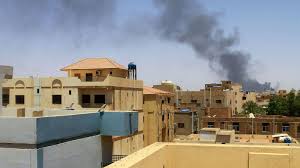Manas Dasgupta
NEW DELHI, Apr 21: The Prime Minister Narendra Modi held a high-level meeting on Saturday to review the security situation in Sudan via video-conferencing, asking officials to prepare contingency evacuation plans for Indians stranded in the country.
The meeting, chaired by the PM, was attended by External Affairs Minister S. Jaishankar, National Security Advisor Ajit Doval, Indian ambassador to Sudan B.S. Mubarak, Foreign Secretary Vinay Mohan Kwatra, Secretary in charge of Overseas Indian Affairs Ausaf Sayeed, and high level officials from the air force and navy.
Official sources said India was preparing contingency plans to evacuate its 3,000 odd citizens stranded in Sudan where a major conflict has broken out between the paramilitary Rapid Support Forces and the Sudanese Armed Forces.
Modi assessed the most recent developments in Sudan and received a first-hand report of the conditions on the ground, with specific focus on the safety of over 3,000 Indian citizens presently located throughout the country, a government statement said. The Prime Minister expressed his condolences on the passing away of an Indian national who tragically fell victim to a stray bullet last week.
Modi instructed officials to remain vigilant, closely monitoring developments and continuously evaluating the safety of Indian nationals in Sudan and extending them all possible assistance. The Prime Minister also emphasised the importance of maintaining close communication with neighbouring countries in the region, as well as those with significant numbers of citizens in Sudan.
Earlier, Jaishankar — who stopped at New York en route to Latin America — met with the UN Secretary General Antonio Guterres and discussed the evolving situation in Sudan, among other issues. The Ministry of External Affairs on Thursday cautioned Indians in Sudan about the active fighting raging near the Indian mission in Khartoum and urged them to avoid the embassy for the time being. The government says the situation in Sudan is “very tense” and it is focusing on ensuring the safety and well-being of the Indian community, including working on contingency plans and possible evacuation.
More than 300 people have been killed as the country’s army and paramilitary forces battle, ignoring appeals by world powers for an end-of-Ramadan ceasefire. Sudan’s capital Khartoum has seen some of the fiercest fighting with air strikes and tanks firing in densely packed districts, with most of its five million people sheltering at home in baking heat without electricity, food or water. Communications are heavily disrupted.
Medics have warned of a catastrophe, especially in Khartoum, where many hospitals were reportedly caught in the crossfire. Up to 70 percent of the hospitals in Khartoum and neighbouring states have been rendered “out of service” by the fighting, the doctors’ union said.
It has warned the numbers of deaths is likely to be far higher than stated, with many wounded unable to reach hospitals. Several countries’ evacuation plans have been put on hold, with the US Defense Department announcing Thursday that it was deploying forces “nearby in the region” with hopes of “securing and potentially facilitating the departure of US Embassy personnel from Sudan.”
The situation in Sudan is difficult as a fragile ceasefire announced by the Rapid Support Forces (RSF) began earlier on Friday on the occasion of Eid. But latest reports suggest that fighting has continued even after the announcement of the ceasefire.
India has maintained contact with the U.S., Saudi Arabia, the U.K. and the UAE on this matter. New Delhi has also maintained contact with Egypt to reduce the tension as differences between the RSF and the SAF continued to escalate over “security sector reform” in Sudan.

